-
 bitcoin
bitcoin $87959.907984 USD
1.34% -
 ethereum
ethereum $2920.497338 USD
3.04% -
 tether
tether $0.999775 USD
0.00% -
 xrp
xrp $2.237324 USD
8.12% -
 bnb
bnb $860.243768 USD
0.90% -
 solana
solana $138.089498 USD
5.43% -
 usd-coin
usd-coin $0.999807 USD
0.01% -
 tron
tron $0.272801 USD
-1.53% -
 dogecoin
dogecoin $0.150904 USD
2.96% -
 cardano
cardano $0.421635 USD
1.97% -
 hyperliquid
hyperliquid $32.152445 USD
2.23% -
 bitcoin-cash
bitcoin-cash $533.301069 USD
-1.94% -
 chainlink
chainlink $12.953417 USD
2.68% -
 unus-sed-leo
unus-sed-leo $9.535951 USD
0.73% -
 zcash
zcash $521.483386 USD
-2.87%
Best pools for IRON mining
IRON mining involves liquidity farming on DeFi platforms like PancakeSwap and QuickSwap, where users earn rewards by staking LP tokens in IRON-based pools across BSC and Polygon networks.
Jul 26, 2025 at 03:56 am
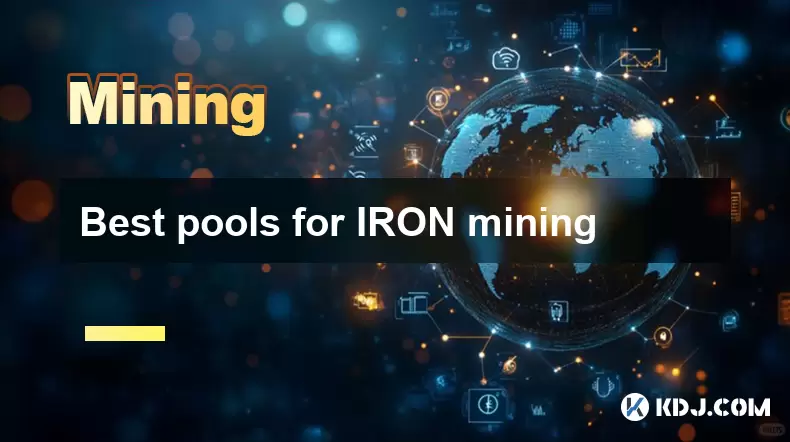
Understanding IRON Mining and Its Unique Mechanism
IRON (Iron Finance) was a decentralized finance (DeFi) project that aimed to create a multi-chain algorithmic stablecoin ecosystem. Although the original IRON token collapsed in mid-2021 due to a bank run, various forks and revived versions have since emerged across different blockchain networks. These newer versions, often referred to as IRON, are typically mined or farmed through liquidity pools on decentralized exchanges. Unlike traditional proof-of-work mining, IRON mining usually refers to liquidity mining, where users provide liquidity to designated pools and earn IRON tokens as rewards.
The mining process involves locking up asset pairs in a liquidity pool on platforms like PancakeSwap, QuickSwap, or ApeSwap, depending on the blockchain. Rewards are distributed based on the proportion of liquidity provided. It is critical to understand that IRON mining does not involve computational hashing but rather yield farming through DeFi protocols. Therefore, the “best pools” are those offering the highest annual percentage yield (APY), lowest impermanent loss risk, and reliable smart contracts.
Top Platforms Hosting IRON Mining Pools
Several decentralized exchanges host IRON-related liquidity pools. The most prominent include:
- PancakeSwap (Binance Smart Chain): Known for high APYs and deep liquidity, PancakeSwap often features IRON paired with BUSD, USDT, or WBNB. Users should look for the IRON-BUSD or IRON-USDT farms.
- ApeSwap (BSC & Polygon): ApeSwap has supported IRON forks and offers farming incentives with boosted yields during promotional campaigns.
- QuickSwap (Polygon): For users seeking lower gas fees, QuickSwap hosts IRON pools on Polygon, particularly IRON-QUICK or IRON-USDC pairs.
- Dfyn Network (Polygon): Another Polygon-based DEX that has hosted IRON liquidity pools with competitive reward structures.
When selecting a platform, verify the contract address of the IRON token to avoid scams. Use block explorers like BscScan or Polygonscan to confirm the legitimacy of the pool. Also, check the total value locked (TVL)—higher TVL usually indicates greater trust and stability.
How to Join an IRON Mining Pool: Step-by-Step Guide
To participate in IRON mining, follow these steps carefully:
- Connect your Web3 wallet (e.g., MetaMask or Trust Wallet) to the chosen DEX platform.
- Navigate to the Liquidity section and select 'Add Liquidity'.
- Choose the token pair for the IRON pool (e.g., IRON and BUSD).
- Enter the amount of each token you wish to deposit. The interface will auto-calculate the equivalent value.
- Approve each token for spending if prompted. This requires two separate transactions.
- Confirm the liquidity provision. You will receive LP (Liquidity Provider) tokens in return.
- Go to the Farms section and locate the corresponding IRON farm.
- Stake your LP tokens in the designated farm to begin earning IRON rewards.
Ensure your wallet is configured for the correct network (e.g., Binance Smart Chain or Polygon). Incorrect network settings may result in lost funds. Always double-check transaction details before confirming.
Factors to Evaluate When Choosing an IRON Pool
Not all IRON mining pools are equal. Consider the following criteria:
- APY and Reward Rate: Compare the current reward rate across platforms. High APYs may be attractive but can be unsustainable.
- Impermanent Loss Risk: Pools with stablecoin pairs (e.g., IRON-BUSD) generally have lower volatility and reduced impermanent loss.
- Token Contract Verification: Use BscScan or Polygonscan to verify the IRON token contract. Avoid pools with unverified or suspicious contracts.
- Transaction Fees: On BSC, fees are low, but on Ethereum, they may outweigh rewards. Polygon offers a balanced alternative.
- Community and Project Activity: Check the project’s Telegram, Discord, or Twitter for updates. Active development teams are a positive sign.
- Audit Status: Pools backed by audited smart contracts reduce the risk of exploits.
Pools offering auto-compounding features can enhance returns by automatically reinvesting rewards, minimizing manual effort and gas costs.
Security Measures and Risk Mitigation
Engaging in IRON mining carries inherent risks. To protect your assets:
- Use hardware wallets or trusted software wallets with strong passwords.
- Never share your private key or seed phrase.
- Interact only with verified contract addresses. Bookmark official project links.
- Enable two-factor authentication (2FA) on associated accounts.
- Limit approvals to necessary amounts. Use tools like Revoke.cash to cancel unused token approvals.
- Monitor your staked positions regularly through the DEX interface or portfolio trackers like Zapper.fi or Zerion.
Be cautious of 'too good to be true' APYs, which may indicate a rug pull or honeypot scam. If withdrawal fails or rewards stop suddenly, exit the pool immediately.
Monitoring and Optimizing IRON Mining Returns
To maximize profitability:
- Track your rewards using the 'Earn' dashboard on the DEX platform.
- Reinvest rewards during high APY periods to compound gains.
- Use yield calculators to estimate returns based on current token prices and emission rates.
- Diversify across multiple pools to spread risk.
- Stay updated on token emissions schedules—some pools reduce rewards over time.
Some platforms offer boosted farms for users holding native tokens (e.g., CAKE on PancakeSwap). Acquiring such tokens may increase your IRON yield.
Frequently Asked Questions
Is IRON mining the same as Bitcoin mining?No. IRON mining refers to liquidity mining in DeFi, where users provide tokens to a liquidity pool and earn rewards. Bitcoin mining involves solving cryptographic puzzles using hardware. The mechanisms, infrastructure, and reward systems are entirely different.
Can I lose money while mining IRON?Yes. Risks include impermanent loss, smart contract vulnerabilities, token devaluation, and scams. If the price of IRON drops significantly or the project is abandoned, the value of your rewards and deposited assets may decrease.
How do I claim my IRON rewards?Rewards are typically claimable directly from the Farm interface on the DEX. Click the 'Harvest' button to receive IRON tokens in your wallet. Some platforms auto-claim or offer auto-compound options.
What happens if the IRON pool shuts down?If the pool is discontinued, you should unstake your LP tokens and remove liquidity as soon as possible. Failure to do so may result in being unable to withdraw funds, especially if the team disables the contract. Always monitor official channels for shutdown notices.
Disclaimer:info@kdj.com
The information provided is not trading advice. kdj.com does not assume any responsibility for any investments made based on the information provided in this article. Cryptocurrencies are highly volatile and it is highly recommended that you invest with caution after thorough research!
If you believe that the content used on this website infringes your copyright, please contact us immediately (info@kdj.com) and we will delete it promptly.
- Crypto Crossroads: Bitcoin Price Reacts to Fed Jitters Amidst Shifting Sands
- 2026-02-02 05:05:02
- Justin Sun, Tron, Manipulation Allegations: New Bitcoin Strategy Meets Lingering Controversy
- 2026-02-02 05:05:02
- Bitcoin Eyes $77K as Michael Saylor Reaffirms Unwavering Conviction Amidst Market Swings
- 2026-02-02 05:00:02
- Altcoin Season on the Horizon? ETH, XRP, SOL, ADA Face Potential 184x Gains Amidst Shifting Crypto Landscape
- 2026-02-02 05:00:02
- Bitcoin ETF News: Latest Updates Drive Investment and Market Dynamics
- 2026-02-02 04:50:02
- Rare Royal Mint Coin Error Fetches Over £100: The 'Fried Egg' £1 Coin Phenomenon
- 2026-02-02 04:45:01
Related knowledge

How to Earn Passive Income with DePIN Mining? (New Trend 2026)
Feb 01,2026 at 12:40pm
Understanding DePIN Mining Mechanics1. DePIN mining relies on real-world infrastructure participation rather than computational hashing. Users deploy ...
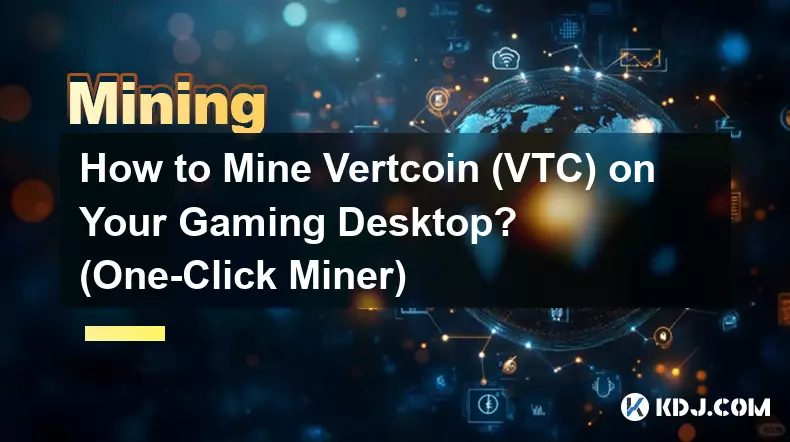
How to Mine Vertcoin (VTC) on Your Gaming Desktop? (One-Click Miner)
Feb 02,2026 at 03:39am
Understanding Vertcoin's Mining Algorithm1. Vertcoin uses the Verthash algorithm, which is intentionally memory-hard and designed to resist ASIC domin...
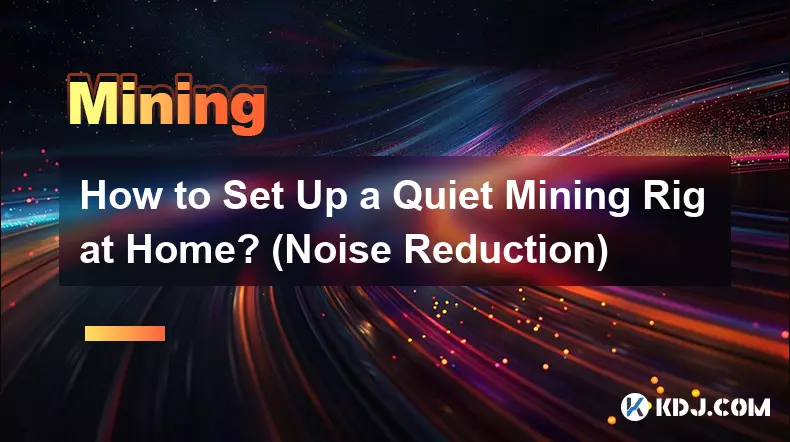
How to Set Up a Quiet Mining Rig at Home? (Noise Reduction)
Feb 01,2026 at 11:00pm
Acoustic Enclosure Design1. Use rigid, dense materials such as MDF or acoustic-grade plywood for the enclosure walls to block mid-to-high frequency no...
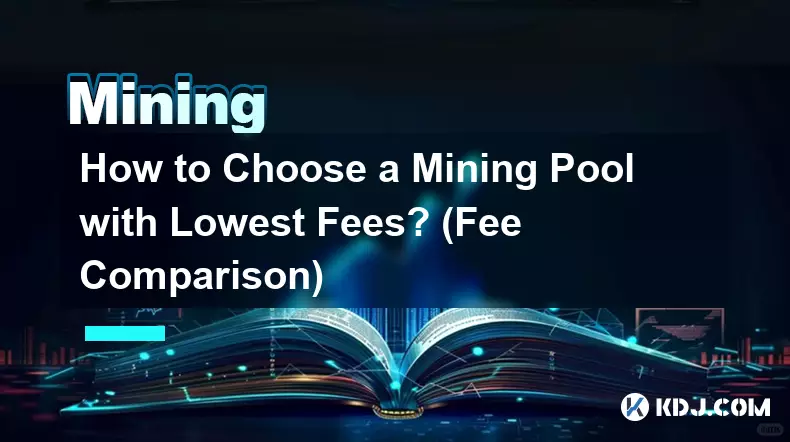
How to Choose a Mining Pool with Lowest Fees? (Fee Comparison)
Feb 02,2026 at 02:39am
Understanding Mining Pool Fee Structures1. Pool operators charge fees to cover infrastructure, maintenance, and administrative costs. These fees manif...

How to Mine Bitcoin on Mac (M1/M2/M3)? (Software Tutorial)
Feb 01,2026 at 07:19pm
Understanding Bitcoin Mining on Apple Silicon1. Bitcoin mining relies on solving cryptographic puzzles using computational power, and Apple’s M1, M2, ...
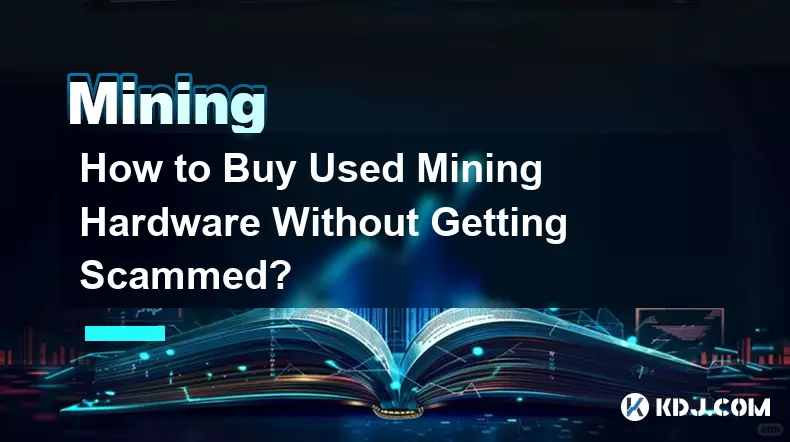
How to Buy Used Mining Hardware Without Getting Scammed?
Feb 01,2026 at 08:00pm
Research the Seller's Reputation Thoroughly1. Check archived listings and feedback on platforms like Bitcointalk forums, Mining Hardware subreddits, a...

How to Earn Passive Income with DePIN Mining? (New Trend 2026)
Feb 01,2026 at 12:40pm
Understanding DePIN Mining Mechanics1. DePIN mining relies on real-world infrastructure participation rather than computational hashing. Users deploy ...

How to Mine Vertcoin (VTC) on Your Gaming Desktop? (One-Click Miner)
Feb 02,2026 at 03:39am
Understanding Vertcoin's Mining Algorithm1. Vertcoin uses the Verthash algorithm, which is intentionally memory-hard and designed to resist ASIC domin...

How to Set Up a Quiet Mining Rig at Home? (Noise Reduction)
Feb 01,2026 at 11:00pm
Acoustic Enclosure Design1. Use rigid, dense materials such as MDF or acoustic-grade plywood for the enclosure walls to block mid-to-high frequency no...

How to Choose a Mining Pool with Lowest Fees? (Fee Comparison)
Feb 02,2026 at 02:39am
Understanding Mining Pool Fee Structures1. Pool operators charge fees to cover infrastructure, maintenance, and administrative costs. These fees manif...

How to Mine Bitcoin on Mac (M1/M2/M3)? (Software Tutorial)
Feb 01,2026 at 07:19pm
Understanding Bitcoin Mining on Apple Silicon1. Bitcoin mining relies on solving cryptographic puzzles using computational power, and Apple’s M1, M2, ...

How to Buy Used Mining Hardware Without Getting Scammed?
Feb 01,2026 at 08:00pm
Research the Seller's Reputation Thoroughly1. Check archived listings and feedback on platforms like Bitcointalk forums, Mining Hardware subreddits, a...
See all articles










































































